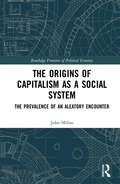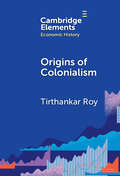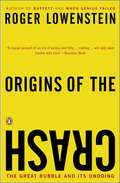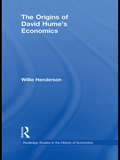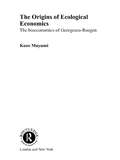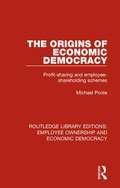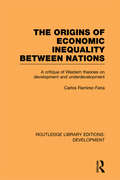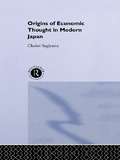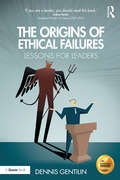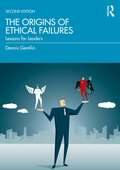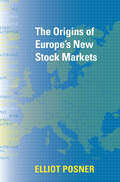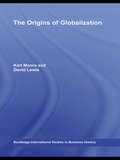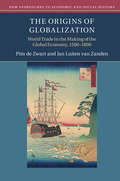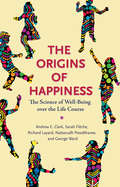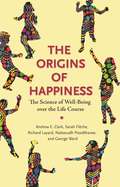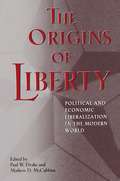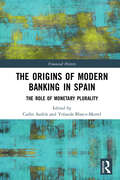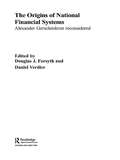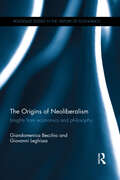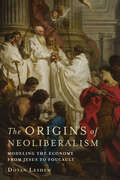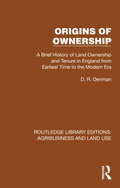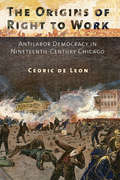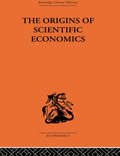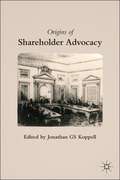- Table View
- List View
The Origins of Capitalism as a Social System: The Prevalence of an Aleatory Encounter (Routledge Frontiers of Political Economy)
by John MiliosEconomists, historians and social scientists have offered a variety of conflicting answers to the issue of the beginnings of capitalism and these deviating answers imply different conceptualizations of what capitalism actually is. This book provides a simultaneous inquiry into the origins of capitalism as well as provides a theoretical treatise on capitalism. The Origins of Capitalism as a Social System explores the line between what is and is not capitalism, (re)producing a theory of capitalism as a system of class domination and exploitation. Part I of the book focuses on the monetary theory of value and capital developed by Karl Marx, while at the same time critically reviews an array of economic and historical literature, both Marxist and non-Marxist. Following this, Part II expounds the first emergence of capitalism in Venice. It highlights the historical contingencies that made capitalism in the Venetian society possible, as well as the structural elements of the capitalist system and their interconnectedness. Finally, Part III discusses the capitalist character of the Venetian social formation from the end of the fourteenth century until the fall of the republic to Napoleon in 1797. As part of this, the author investigates the significance of forms of governmentality beyond national cohesion and territorialization. Of great interest to economists, historians and both undergraduate and postgraduate students, this book gives special emphasis to a critical evaluation of the tensions and controversies between historians, economists and other social scientists with regard to the character and role that money and trade played in societies and economies.
Origins of Colonialism: Why Geography Mattered (Elements in Economic History)
by Tirthankar RoyHistorians explain the eighteenth-century origin of European colonialism in Asia either with the profile of the merchants or an argument about uneven power. This Element suggests that the environment was an important factor, too. With India (1600-1800) as the primary example, it says that the tropical monsoon climatic condition, extreme seasonality, and low land yield made the land-tax-based empires weak from within. The seaboard supplied a more benign environment. Sometime in the eighteenth century, a transformation began as the seaside traded more, generated complementary services, and encouraged the in-migration of capital and skills to supply these services. The birth of a new state from this base depended, however, on building connections inland, which was still a dangerous and uncertain enterprise. European merchants were an enabling force in doing this. But we cannot understand the process without close attention to geography.
Origins Of The Crash: The Great Bubble And Its Undoing
by Roger LowensteinWith his singular gift for turning complex financial events into eminently readable stories, Roger Lowenstein lays bare the labyrinthine events of the manic and tumultuous 1990s. In an enthralling narrative, he ties together all of the characters of the dot-com bubble and offers a unique portrait of the culture of the era. Just as John Kenneth Galbraith's The Great Crash was a defining text of the Great Depression, Lowenstein's Origins of the Crash is destined to be the book that will frame our understanding of the 1990s.
The Origins of David Hume's Economics (Routledge Studies in the History of Economics)
by Willie HendersonThe book covers Hume’s biographical development; his self appraisal as a 'man of letters’; his philosophical writings with emphasis on their direct and indirect economic content; his self-aware criticism of his approach to the Treatise and the development of his rhetorical understanding of the needs/interests of his readers/potential readers; his rhetorical turn and Ciceronian adjustments to his writing within the genre of the essay, including his two Enquiries; his political essays and his nine essays conventionally classified as economic. The work aims to show how the Treatise and its vicissitudes gave rise to his economics. The work takes a broad approach to Hume and his writings on economic topics from the Treatise, through the Enquires and on to his political and economic essay. The work also explores Hume’s textual method and charts the move from abstruse philosophy to a Ciceronian engagement with social conditions and problems as developed in the Political Discourses. In addition, Hume’s extensive use of analogies is also brought into clearer focus than is found in other texts. Overall, the book will be of great use to both postgraduates and undergraduates alike.
The Origins of Ecological Economics: The Bioeconomics of Georgescu-Roegen (Routledge Research In Environmental Economics Ser. #1)
by Kozo MayumiNicholas Georgescu-Roegen deserves to be called the father of ecological economics. This book connects Georgescu-Roegen's earlier work such as consumer choice theory and a critique of Leontief's dynamic model, with his later ambitious attempt to reformulate the economic process as 'bioeconomics', a theoretical alternative to neoclassical economics.
The Origins of Economic Democracy: Profit Sharing and Employee Shareholding Schemes (Routledge Library Editions: Employee Ownership and Economic Democracy #9)
by Michael PooleThis work, originally published in 1989, examines a highly important phenomenon: the growth of profit-sharing and share-ownership schemes for employees within the company. The Origins of Economic Democracy traces the origins and developments of such schemes internationally, and presents an explanatory framework for understanding their emergence. Both legislation and economic conditions play key roles in determining the popularity of such schemes for companies and their employees. The subject of profit-sharing is of vital importance to companies endeavouring to improve their financial performance while increasing the degree of job satisfaction and organizational loyalty of staff members.
The Origins of Economic Inequality Between Nations: A Critique of Western Theories on Development and Underdevelopment (Routledge Library Editions: Development)
by Carlos Ramirez-FariaFirst published in 1991 this text provides an incisive analysis of theories concerning the origins of economic inequality between nations. Central to the author’s investigation is the concept of underdevelopment, and a focus on successive Western ‘systems of conceptualisation’ of the relationship between the west and the rest of the world. The first part of the book concerns the Marx/Engels theory of the Asiatic mode of production, and the anti-Imperialist reaction against Eurocentrisim initiated by the theoretical synthesis of J. A. Hobson. This is followed by an examination of the post-World War II era, particularly the evolution of development studies and the differing versions of dependency theory. The author concludes with an analysis of the most recent reactions against economic imperialism and dependency theory, and concludes with an assessment of their implications for the further economic development of today’s Third World.
The Origins of Economic Thought in Modern Japan
by Chuhei SugiyamaBy throwing light on economic thought in the period of the Japanese Enlightenment, this book will make clear what led to the institutionalization of business and economic education, the birth of the pioneer business enterprise and of serious economic journalism and the reasons behind the success of Japanese economic development.
The Origins of Ethical Failures: Lessons for Leaders
by Dennis GentilinIn 2001, as a young university graduate, Dennis Gentilin became a member of a FX trading desk at one of Australia’s largest banks, the National Australia Bank. In the years that followed the desk became involved in a trading scandal that resulted in the resignation of the chairman and CEO, the upheaval of the board of directors, significant financial loss, and incalculable reputational damage. It was in this environment that the true meaning of business ethics was revealed to Gentilin. In this ground breaking book, Gentilin draws on both his personal experience and the emerging literature in the various disciplines of psychology to provide a very unique insight into the origins of ethical failures. The intellectual depth Gentilin provides coupled with his real life reflections make this book a must read for senior leaders, regulators, consultants, students and practitioners. Amongst other things, the book highlights the shortcomings associated with the traditional approaches used to explain and address ethical failures and illustrates how easily we can all, individuals and organisations alike, be complicit to unethical conduct. More importantly, it provides lessons and guidance to all leaders who aspire to build institutions that are more resilient to ethical failure.
The Origins of Ethical Failures: Lessons for Leaders
by Dennis GentilinIn this thoroughly updated new edition of his ground-breaking and award-winning book, Dennis Gentilin draws on both his personal experience as a well-known whistleblower and recent events in the Australian financial services industry to provide insights into how widespread, systemic ethical failure can take hold in an industry and, crucially, what leaders need to focus on to avoid it. In 2001, as a young university graduate, Dennis Gentilin became a member of an FX trading desk at one of Australia’s largest banks, the National Australia Bank. In the years that followed, the desk became involved in a trading scandal that resulted in the resignation of the chairman and CEO, the collapse of the board, significant financial loss and incalculable reputational damage. Over the past decade, the frequency of ethical failure within the Australian financial services industry has only increased. Among other failures, there have been multiple breaches of the Anti-Money Laundering and Counter-Terrorism Financing Act, rigging of the benchmark BBSW interest rate, mis-selling of consumer credit insurance and predatory sales practices. In this new edition, Gentilin draws on experimental research from economics and finance to illustrate how, when the conditions are permissive, humans have a predisposition towards dishonesty, and therefore, to reduce the likelihood of ethical failure, leaders must focus obsessively on putting in place appropriate institutional arrangements. Gentilin’s combination of intellectual rigour and real-life reflections makes this book a must-read for students, practitioners and leaders alike who would like to develop a deeper understanding of corporate ethics, governance and conduct.
The Origins of Europe's New Stock Markets
by Elliot PosnerBetween 1995 and 2007, financial elites in more than a dozen western European countries engaged in a cross-border battle to create some twenty new stock markets, many of which were explicitly modeled on the American Nasdaq. The resulting high-risk, high-reward markets facilitated wealth creation, rewarded venture capitalists, and drew major U.S. financial players to Europe. But they also chipped away at the European social compacts between national governments and citizens, opening the door of smaller company finance to the broad trend of marketization and its bounties, and further subjecting European households and family businesses to the rhythms of global capital. Elliot Posner explores the causes of Europe’s emergence as a global financial power, addressing classic and new questions about the origins of markets and their relationship to politics and bureaucracy. In doing so, he attributes the surprising large-scale transformation of Europe’s capital markets to the rise of the European Union as a global political force. The effect of Europe’s financial ascendance will have major ramifications around the world, and Posner’s analysis will push market participants, policymakers, and academics to rethink the sources of financial change in Europe and beyond.
The Origins of Globalization (Routledge International Studies in Business History)
by Karl Moore David Charles LewisOrigins of Globalization draws widely on ancient sources and modern economic theory to detail the concept of “known world” globalization, arguing that a mixed economy--similar in many respects to our own--existed in a variety of forms throughout the ancient world. By analyzing the business practices of the ancient world--phenomena such as resource and market seeking behavior, international trade from China, India and Rome, to Africa and even northern and western parts of Europe, Small and Medium Size Enterprises (SMEs) operating internationally and outsourcing production, multicultural workforces, tariff reduced zones, interregional tax issues, and the management of currency risks--the authors provide readers with a unique historical interpretation of the contemporary globalizing economy and a durable theoretical framework for future historical economic analyses.
The Origins of Globalization: World Trade in the Making of the Global Economy, 1500-1800 (New Approaches to Economic and Social History)
by Pim De Zwart Jan Luiten van ZandenFor better or for worse, in recent times the rapid growth of international economic exchange has changed our lives. But when did this process of globalization begin, and what effects did it have on economies and societies? Pim de Zwart and Jan Luiten van Zanden argue that the networks of trade established after the voyages of Columbus and Da Gama of the late fifteenth century had transformative effects inaugurating the first era of globalization. The global flows of ships, people, money and commodities between 1500 and 1800 were substantial, and the re-alignment of production and distribution resulting from these connections had important consequences for demography, well-being, state formation and the long-term economic growth prospects of the societies involved in the newly created global economy. Whether early globalization had benign or malignant effects differed by region, but the world economy as we now know it originated in these changes in the early modern period.
The Origins of Happiness: The Science of Well-Being over the Life Course
by Andrew E. Clark Sarah Flèche Richard Layard Nattavudh Powdthavee George WardWhat makes people happy? Why should governments care about people’s well-being? How would policy change if well-being was the main objective? The Origins of Happiness seeks to revolutionize how we think about human priorities and to promote public policy changes that are based on what really matters to people. Drawing on a uniquely comprehensive range of evidence from longitudinal data on over one hundred thousand individuals in Britain, the United States, Australia, and Germany, the authors consider the key factors that affect human well-being.The authors explore factors such as income, education, employment, family conflict, health, childcare, and crime—and their findings are not what we might expect. Contrary to received wisdom, income inequality accounts for only two percent or less of the variance in happiness across the population; the critical factors affecting a person’s happiness are their relationships and their mental and physical health. More people are in misery due to mental illness than to poverty, unemployment, or physical illness. Examining how childhood influences happiness in adulthood, the authors show that academic performance is a less important predictor than emotional health and behavior, which is shaped tremendously by schools, individual teachers, and parents. For policymakers, the authors propose new forms of cost-effectiveness analysis that places well-being at center stage.Groundbreaking in its scope and results, The Origins of Happiness offers all of us a new vision for how we might become more healthy, happy, and whole.
The Origins of Happiness: The Science of Well-Being over the Life Course
by Andrew Clark Sarah Flèche Richard Layard Nattavudh Powdthavee George WardA new perspective on life satisfaction and well-being over the life courseWhat makes people happy? The Origins of Happiness seeks to revolutionize how we think about human priorities and to promote public policy changes that are based on what really matters to people. Drawing on a range of evidence using large-scale data from various countries, the authors consider the key factors that affect human well-being, including income, education, employment, family conflict, health, childcare, and crime. The Origins of Happiness offers a groundbreaking new vision for how we might become more healthy, happy, and whole.
The Origins of Liberty: Political and Economic Liberalization in the Modern World
by Paul W. Drake & Mathew D. McCubbinsWhy would sovereigns ever grant political or economic liberty to their subjects? Under what conditions would rational rulers who possess ultimate authority and who seek to maximize power and wealth ever give up any of that authority? This book draws on a wide array of empirical and theoretical approaches to answer these questions, investigating both why sovereign powers might liberalize and when. The contributors to this volume argue that liberalization or democratization will only occur when those in power calculate that the expected benefits to them will exceed the costs. More specifically, rulers take five main concerns into account in their cost-benefit analysis as they decide to reinforce or relax controls: personal welfare, personal power, internal order, external order, and control over policy--particularly economic policy. The book shows that repression is a tempting first option for rulers seeking to maximize their benefits, but that liberalization becomes more attractive as a means of minimizing losses when it becomes increasingly certain that the alternatives are chaos, deposition, or even death. Chapters cover topics as diverse as the politics of seventeenth-century England and of twentieth-century Chile; why so many countries have liberalized in recent decades; and why even democratic governments see a need to reduce state power. The book makes use of formal modeling, statistical analysis, and traditional historical analysis. The contributors are Paul Drake, Stephen Haggard, William Heller, Robert Kaufman, Phil Keefer, Brian Loveman, Mathew McCubbins, Douglass North, Ronald Rogowski, and Barry Weingast.
The Origins of Modern Banking in Spain: The Role of Monetary Plurality (Financial History #1)
by Carles Sudrià Yolanda Blasco-MartelThis book analyses the formation of the Spanish banking system. It provides a general overview of European financial systems in operation during the mid-nineteenth century, followed by a detailed analysis of the economic and institutional changes that gave rise to a new form of banking in Spain. <P><P>The chapters analyse changes on banking regulation; study the social origin of banks’ promoters; investigate the economic results of banks; and evaluate the interaction between banks and the economy as a whole. Finally, the causes, extent and consequences of monetary plurality in Spain and its European context are discussed. As such, this book covers the gap that exists in the Spanish banking historiography. Until now only the Bank of Spain and its predecessors had been adequately examined. As the Bank of Spain acted mostly as the state’s financial agent, we know very little about private-sector financing. This text provides data and analysis for a more comprehensive view of early Spanish financial development in a comparative European framework.The Origins of Modern Banking in Spain should be considered essential reading for financial history students and scholars, as well as anybody interested in longview approaches to modern financial development.
The Origins of Modern Banking in Spain: The Role of Monetary Plurality (ISSN)
by Carles Sudrià Yolanda Blasco-MartelThis book analyses the formation of the Spanish banking system. It provides a general overview of European financial systems in operation during the mid-nineteenth century, followed by a detailed analysis of the economic and institutional changes that gave rise to a new form of banking in Spain.The chapters analyse changes on banking regulation; study the social origin of banks’ promoters; investigate the economic results of banks; and evaluate the interaction between banks and the economy as a whole. Finally, the causes, extent and consequences of monetary plurality in Spain and its European context are discussed. As such, this book covers the gap that exists in the Spanish banking historiography. Until now only the Bank of Spain and its predecessors had been adequately examined. As the Bank of Spain acted mostly as the state’s financial agent, we know very little about private-sector financing. This text provides data and analysis for a more comprehensive view of early Spanish financial development in a comparative European framework. The Origins of Modern Banking in Spain should be considered essential reading for financial history students and scholars, as well as anybody interested in longview approaches to modern financial development.
The Origins of National Financial Systems: Alexander Gerschenkron Reconsidered (Routledge Explorations in Economic History)
by Douglas J. Forsyth Daniel VerdierSince the nineteenth century, there has been an accepted distinction between financial systems that separate commercial and investment banking and those that do not. This comprehensive collection aims to establish how and why financial systems develop, and how knowledge of financial differentiation in the nineteenth century may afford insight into the development of contemporary banking structure. This book poses a systematic challenge to Alexander Gerschenkron's 1950s thesis on universal banks. With contributions from leading scholars such as Ranald Michie and Jaime Reis, this well written book provides solid and intriguing arguments throughout.
The Origins of Neoliberalism: Insights from economics and philosophy (Routledge Studies in the History of Economics)
by Giandomenica Becchio Giovanni LeghissaNeoliberalism is a doctrine that adopts a free market policy in a deregulated political framework. In recent years, neoliberalism has become increasingly prominent as a doctrine in Western society, and has been heavily discussed in both academia and the media. In The Origins of Neoliberalism, the joint effort of an economist and a philosopher offers a theoretical overview of both neoliberalism’s genesis within economic theory and social studies as well as its development outside academia. Tracing the sources of neoliberalism within the history of economic thought, the book explores the differences between neoliberalism and classical liberalism. This book’s aim is to make clear that neoliberalism is not a natural development of the old classical liberalism, but rather that it represents a dramatic alteration of its original nature and meaning. Also, it fights against the current idea according to which neoliberalism would coincide with the triumph of free market economy. In its use of both history of economics and philosophy, this book takes a highly original approach to the concept of neoliberalism. The analysis presented here will be of great interest to scholars and students of history of economics, political economy, and philosophy of social science.
The Origins of Neoliberalism: Modeling the Economy from Jesus to Foucault
by Dotan LeshemDotan Leshem recasts the history of the West from an economic perspective, bringing politics, philosophy, and the economy closer together and revealing the significant role of Christian theology in shaping economic and political thought. He begins with early Christian treatment of economic knowledge and the effect of this interaction on ancient politics and philosophy. He then follows the secularization of the economy in liberal and neoliberal theory.Leshem draws on Hannah Arendt's history of politics and Michel Foucault's genealogy of economy and philosophy. He consults exegetical and apologetic tracts, homilies and eulogies, manuals and correspondence, and Church canons and creeds to trace the influence of the economy on Christian orthodoxy. Only by relocating the origins of modernity in Late Antiquity, Leshem argues, can we confront the full effect of the neoliberal marketized economy on contemporary societies. Then, he proposes, a new political philosophy that re-secularizes the economy will take shape and transform the human condition.
Origins of Ownership: A Brief History of Land Ownership and Tenure from Earliest Time to the Modern Era (Routledge Library Editions: Agribusiness and Land Use #4)
by D. R. DenmanThe English systems of land tenure have influenced land-holding far beyond Britain. Freehold, for example, a common-place in many places, has its origin in the feudal tenure of Anglo-Norman England. Much has been written about the origins of English land ownership but the contributions are hidden. This book, originally published in 1958 draws together legal, economic and social historical themes, introducing the reader to the authoritative texts of the many aspects of the subject up until the 16th Century.
The Origins of Right to Work: Antilabor Democracy in Nineteenth-Century Chicago
by Cedric De Leon"Right to work" states weaken collective bargaining rights and limit the ability of unions to effectively advocate on behalf of workers. As more and more states consider enacting right-to-work laws, observers trace the contemporary attack on organized labor to the 1980s and the Reagan era. In The Origins of Right to Work, however, Cedric de Leon contends that this antagonism began a century earlier with the Northern victory in the U.S. Civil War, when the political establishment revised the English common-law doctrine of conspiracy to equate collective bargaining with the enslavement of free white men. In doing so, de Leon connects past and present, raising critical questions that address pressing social issues. Drawing on the changing relationship between political parties and workers in nineteenth-century Chicago, de Leon concludes that if workers' collective rights are to be preserved in a global economy, workers must chart a course of political independence and overcome long-standing racial and ethnic divisions.
The Origins of Scientific Economics: English Economic Thought, 1660-1776 (Routledge Library Editions)
by William LetwinThis book illustrates how the first social science, that of economics, was built. It examines and discusses the work of Josiah Child, Nicholas Barbon, John Collins, William Petty, John Locke and Dudley North and the economic theories of the seventeenth and eighteenth centuries.
Origins of Shareholder Advocacy
by Jonathan Gs KoppellThis volume deals with issues of widespread interest including, the origins of investor rights in different markets, the political, legal and economic conditions that determine levels of shareholder participation, and the implications of variation in investor rights.
